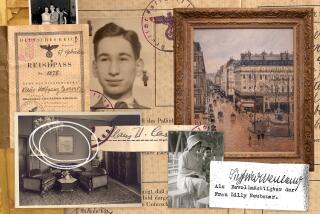Even After the War, Swiss Protected Nazi Gold
- Share via
NEW YORK — The long-awaited “Nazi gold” report--200 pages compiled by 11 U.S. government agencies--was released last Wednesday, and almost nobody looks good. The United States, it is clear, knew full well that the Nazi gold hoard captured in the closing days of World War II included gold stolen from individuals as well as central banks, yet it made no attempt to return the looted wealth to private citizens. The United States also failed to press the Swiss hard to make restitution, and failed to react when Switzerland broke the agreements it made with the Allies.
This is not quite as bad as it looks now. Europe in 1946 was in ruins, and tens of millions of innocent civilians had lost property and money because of the war. In the chaotic conditions then prevailing, reasonable people could accept the idea that the main thing was to make restitu-tion to governments, and then let governments be responsible for compensating individual citizens as they thought best.
But if the Western allies are embarrassed by the report, the Swiss are--or should be--confounded. The report, produced under the direction of Stuart E. Eizenstat, leaves Switzerland’s reputation looking like another famous product of the republic: cheesy and full of holes.
A Swiss government statement in response to the report reminded the world that the poor little Swiss were “encircled and threatened by the Nazis and the fascists.”
Clearly, the Swiss need a new P.R. firm. The U.S. report goes beyond Swiss actions during the war to show how Switzerland helped the Nazis after the war, when Switzerland tenaciously defied Allied pressure to return Nazi loot to the rightful owners.
Under tough pressure from the victorious Allies, the Swiss agreed to restore some of the looted gold. Then they broke the agreement and continued to protect Nazi assets.
This disclosure devastates the “poor little Switzerland” defense. If the Swiss had truly hated the Nazis, no one would have had to force them to collaborate with the Allies in returning stolen property after the war. Free at last of those evil Nazis, the Swiss would have lept to restore looted assets to rightful owners.
That isn’t what happened. The same Swiss who, they now claim, cowered like rats before Nazi threats, rose up and fought like lions to defend the Nazi’s from Allied threats. At the same time, the Swiss banks threw up every obstacle they could in the way of Jewish victims and their relatives who sought access to family wealth deposited before the war.
Before, during and after World War II, Swiss policy was one law for Nazis, another for Jews. Compassion, even solidarity with criminals; contempt for victims and indifference to their rights.
This tradition is, apparently, still at work in Switzerland today. As President Mobutu Sese Seko of Zaire fled the country he had looted and pillaged for years, the Swiss were allegedly still guarding his ill-gotten wealth under cover of their infamous secrecy laws. Drug lords and dictators can apparently still count on the Swiss to shelter money without regard for morality. Tax cheats everywhere know they have friends in Switzerland--a country that has built an economy on the basis of collaborating with criminals.
For the Swiss banking system, this sort of behavior isn’t a troubling ethical conundrum; it’s a competitive advantage. Swiss banks are attractive to international depositors precisely because of the secrecy they provide for criminals and tax cheats. From this point of view, Swiss collaboration with the Nazis wasn’t a deviation from the principles of Swiss banking--it was a classic expression of Swiss ethics at work.
The surprising thing about the Swiss banks isn’t that they kept their promises to the Nazis. That’s what they do--it’s the basis of their business.
The surprise is that they broke their promises to the Jews. The discretion and loyalty that Swiss banks promise their clients should have meant that the Swiss bent over backward to return assets to the Jews and their heirs who sought the protection of Swiss secrecy to protect their money from the Nazis.
Had the Swiss honored the deposits of the Jews, they could have mounted a defense against the charges facing them today. “Yes,” the Swiss could say, “we helped the Nazis, Marcos and Mobutu keep their money. But we also protected the assets of victims.”
Secret banking is not necessarily bad banking. Governments do occasionally try to plunder their citizens. People really did need the protection of Swiss banks against Nazi and communist thieves. Bank secrecy may not be a perfect solution to this problem but, potentially, it is a tolerable one--if the secret bankers are truly neutral and discreet.
This is where the Swiss failed. The anti-Semitism of Switzerland during and after the war was so strong that the Swiss banking system defaulted on the one moral obligation Swiss banks claim to observe: the obligation to depositors.
Evidently, this was not a momentary aberration; for decades, the Swiss banks stonewalled everyone attempting to return the deposits of Holocaust victims to their rightful owners.
Sadly, the bankers appear to reflect Swiss public opinion. Polls show that most Swiss oppose the proposed victim-relief fund that the Swiss banks and government reluctantly and under intense pressure agreed to set up. Christoph Meili, the business-school student who, as a night watchman at a Swiss bank, saved Holocaust-era files from the shredder, has been fired from his job, his children have been threatened and he reports that local Swiss police were uncooperative when he asked for protection.
This scandal is likely to have far-reaching effects on the Swiss banking industry. Evidence that the banks defaulted wholesale on their obligations to those customers who needed them most will undermine the world’s confidence that the Swiss can be trusted. Individual investors, private firms and governments will take note. In the United States, state, local and federal governments are likely to review the status of Swiss banks in their jurisdictions.
Even before this latest scandal, Swiss banking secrecy was under pressure. The member countries of the European Community don’t want their citizens evading taxes with Swiss connivance. Growing international concern about the drug trade and the growth of criminal syndicates in Russia also put the Swiss in an uncomfortable spotlight.
In the end, it seems likely that Swiss banks will pay a high price for their double dealing. Nobody made the Swiss withhold Jewish assets and protect Nazis after the war. That was a choice they made freely.
Now Switzerland faces another choice: Own up to its past and take responsibility--or face serious legal and financial consequences. Either way, the Swiss banking industry could face fundamental changes before this scandal is resolved.
More to Read
Sign up for Essential California
The most important California stories and recommendations in your inbox every morning.
You may occasionally receive promotional content from the Los Angeles Times.










